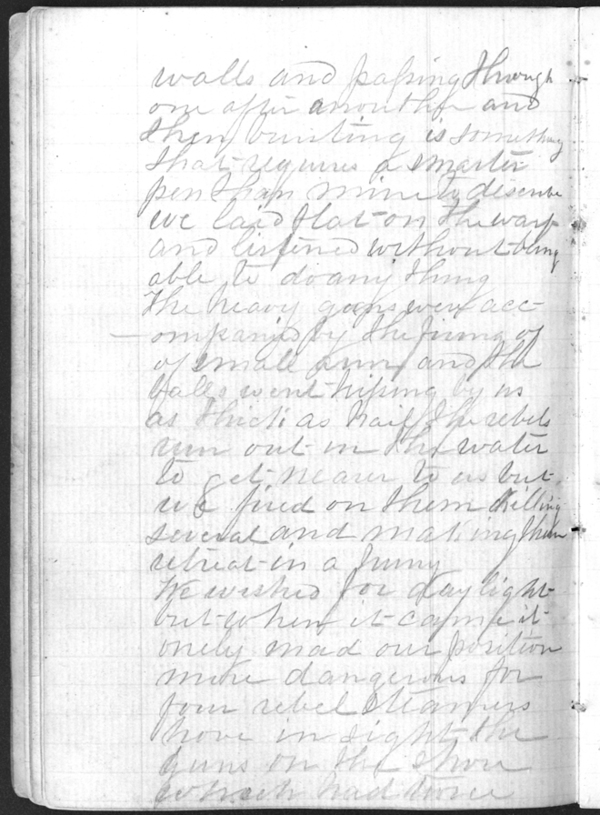| << Chapter < Page | Chapter >> Page > |
Alexander Hobbs’s experiences clearly were atypical of many Civil War soldiers. He did not undergo the constant campaigning reflective of military life in Virginia, Tennessee, or Georgia, nor did his unit engage in multiple large-scale battles. Instead, the very nature and day-to-day accounts of his service allowed Hobbs to ruminate on traditionally under-valued aspects of the wartime experience: perceptions of civilian culture in the Gulf South, the nebulous question of Confederate loyalty as perceived through northern eyes, and interactions with civilians in Texas as a prisoner of war. Readers will quickly glean from his writings rich and varied depictions of wartime life in the regions far removed from the “principal” war in Virginia. For example, when his unit sojourned at Key West Hobbs wrote, “to us who had never been at the south the trees and fruit looked really pleasant.” And, while he was stationed briefly outside New Orleans, Hobbs commented, “The scenery on the banks of the river for the most part has been delightful. [B]eautiful groves of orange trees which hung full of the golden fruit looked to us verry [ sic ] inviting.”
Although these perceptions certainly reveal how a young man from Massachusetts witnessed his first trip to the Deep South, Civil War teachers would benefit more from Hobbs’s detailed treatment of the war along the Gulf Coast and his explicit criticisms of slavery. Teachers can use Hobbs’s entries on the battle of Galveston to compare to more famous Civil War battles such as Shiloh, Antietam, or Gettysburg. Hobbs demonstrates how battles on the Texas coast, such as Galveston, were relatively small, involved joint army, navy, and marine operations, and were sometimes conducted by uninspiring commanders. Based on Hobbs’s characterization of the fight at Galveston, teachers can ask students to consider the similarities and differences between battles in the East fought by the enormous Armies of the Potomac and Northern Virginia and those in the lower Trans-Mississippi Valley waged by small coastal and garrison units.
Diary excerpt, january 1, 1863

Hobbs’s comments on slavery add further texture to the diary and offer a unique perspective to existing historiographical debates. Teachers as well as historians immersed in the current literature on Civil War soldiers’ outlooks on slavery will undoubtedly find Hobbs’s writings useful and penetrating. Several days after being captured as a prisoner of war, Hobbs commented, “Our negroes have gone to Galveston to build fortifications. The[y] held a prayer meeting last night in our yard and . . . I believe they had the presence of the blessed master. I honestly believe [there]will be more slaves found in heaven than southerners.” A few weeks later, Hobbs witnessed and critiqued the following episode: “Six coloured men have been taken away to prison four of them belonging to the Harriet Lane and two our Col.&Surgeons’s boys. [A]ll but one or two were free born but all are now to be sold together. [S]uch acts only stir up a hatred to the institution of slavery . . . [W]e were never born to be held captive.” These comments reflect the central theme in Chandra Manning’s recent work, What This Cruel War Was Over: Soldiers, Slavery, and the Civil War (2007). Manning argues that slavery was the most important category to soldiers on both sides of the war. Union soldiers particularly, according to Manning, discovered that emancipation made the Union stronger and worth saving, and came to supported equality for blacks.
Finally, Hobbs’s writings raise the murky issue of Confederate loyalty. Scholars have traditionally fallen into two schools of thought on this subject. On the one hand are those who posit that the Confederacy crumbled from within on account of internal fissures combined with a lack of national identity and purpose (Beringer et al., 1986). Other scholars suggest that many white southerners, in spite of hardship and low morale, remained dedicated Confederate nationalists continually in search of an independent southern nation (Gallagher, 1997). As a prisoner of war in Houston, Hobbs continually commented on his comrades trading goods with Confederate Texans. Although he also suggested that these civilians continued to praise the Confederacy, the existence of trade networks with the enemy for the sake of basic survival raises new questions on the soundness of Confederate loyalty. Teachers can use these selections to ask students to determine the relationships between dedication to country, family, or daily sustenance. Hobbs’s writings underscore what Gary W. Gallagher has recently called for in future studies on the Confederate experience. He suggests that historians move beyond the existing binary between “internal defeatist” and “diehard nationalist,” and instead define the neutral middle-ground of those white southerners who did their best merely to survive the war (Gallagher, 2009).
Bibliography
Beringer, Richard et al. Why the South Lost the Civil War. Athens: University of Georgia Press, 1986.
Bosson, Charles P. History of the Forty-Second Regiment Infantry, Massachusetts Volunteers, 1862, 1863, 1864 . Boston: Mills, Knight, and Co., 1886.
Cotham, Edward T. Battle on the Bay: The Civil War Struggle for Galveston . Austin: University of Texas Press, 1998.
Faust, Drew Gilpin. This Republic of Suffering: Death and the American Civil War . New York: Alfred A. Knopf, 2008.
Gallagher, Gary W. The Confederate War . Cambridge: Harvard University Press, 1997.
Gallagher, Gary W. “Disaffection, Persistence, and Nation: Some Directions in Recent Scholarship on the Confederacy,” Civil War History 55 (September 2009): 329-53.
Hearn, Chester G. The Capture of New Orleans, 1862 . Baton Rouge: Louisiana State University Press, 1995.
Manning, Chandra. What This Cruel War Was Over: Soldiers, Slavery, and the Civil War . New York: Alfred A. Knopf, 2007.
Townsend, Stephen A. The Yankee Invasion of Texas . College Station: Texas A&M University Press, 2006.
Wiley, Bell Irvin. The Life of Billy Yank: The Common Soldier of the Union . Indianapolis: Bobbs-Merrill, 1952.

Notification Switch
Would you like to follow the 'Revolution and war in the hemisphere' conversation and receive update notifications?